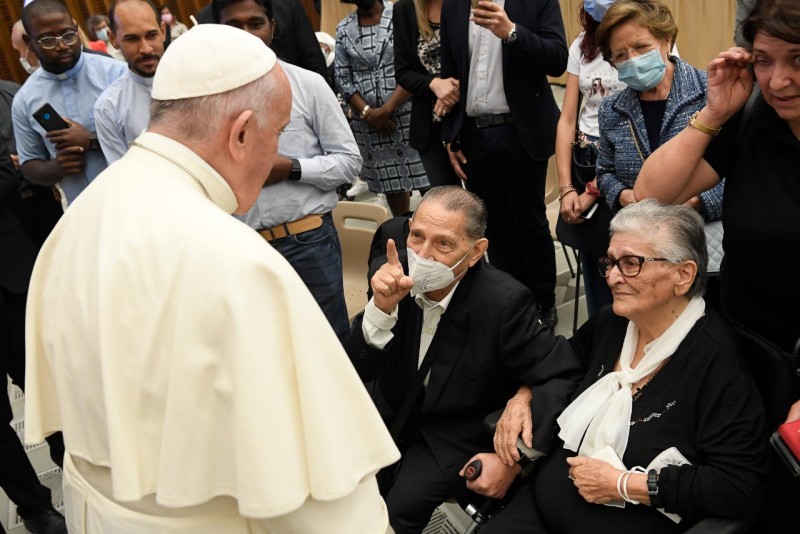Pope Francis recalled at his Wednesday general audience how his veteran grandfather taught him to loathe war.
Speaking in the Vatican’s Paul VI audience hall on March 23, the pope offered a “personal testimony” to the power of hearing an elderly person tell their life story.
He said that he heard about the horrors of the First World War directly from his grandfather, Giovanni Bergoglio, a radio operator caught up in fighting at the Piave River in northern Italy.
“I learned hatred and anger for war from my grandfather, who fought at the Piave in 1914, and he passed on to me this rage at war, because he told me about the suffering of a war,” the pope said.
“And this isn’t learned in books or in other ways… it’s learned in this way, being passed down from grandparents to grandchildren. And this is irreplaceable.”
“Today, unfortunately, this is not the case, and we think that grandparents are discarded material: No! They are the living memory of a people, and young people and children ought to listen to their grandparents.”
The pope has spoken previously of the deep impression left by his grandfather’s war stories.
During a visit to the Augustinian Patristic Institute in Rome in 2018, he noted that today’s young people had no experience of the two world wars.
“I learned from my grandfather who fought in the first one, on the Piave,” he said. “I learned many things from his story … What does a war leave behind? Millions of dead, in the great slaughter.”
The 85-year-old pope made the off-the-cuff comments about his grandfather during his fourth live-streamed catechesis on old age, part of a series he launched in February.
He focused on the biblical story of the death of Moses, which is preceded by the “Song of Moses” (Deuteronomy 32), in which the prophet offers his spiritual testament.
He said: “When Moses pronounces this confession of faith, he is on the threshold of the promised land, and also of his departure from life. He was 120 years old, the account notes, ‘but his eye was not dim’ (Deuteronomy 34:7).”
“That ability to see, to really see, also to see symbolically, as the elderly have, who know how to see things, the most rooted meaning of things.”
Pope Francis expressed concern that “direct, person-to-person storytelling” between generations was dying out because the elderly were considered “waste material.”
“An older person, one who has lived a long time, and receives the gift of a lucid and passionate testimony of his history, is an irreplaceable blessing,” he said.
“Are we capable of recognizing and honoring this gift of the elderly? Does the transmission of faith — and of the meaning of life — follow this path today, of listening to the elderly?”
The pope said that present-day culture, “which is so ‘politically correct,’” posed obstacles to the transmission of wisdom between generations.
He said this also affected the Christian community, which sometimes attempted to pass on the faith without “the passion of a ‘lived history.’”
“How is the faith handed on? ‘Ah, here’s a book, study it.’ No. Faith can’t be handed on like that,” he commented.
“The faith is passed on in dialect, that is, in familiar speech, between grandparents and grandchildren, between parents and their children.”
He went on: “Sometimes I reflect on this strange anomaly. Today, the catechism of Christian initiation generously draws on the Word of God and conveys accurate information on dogmas, the morals of the faith, and the sacraments.”
“What is often lacking, however, is a knowledge of the Church that comes from listening to and witnessing the real history of the faith and the life of the Church community, from the beginning to the present day.”
He added: “It would be a good thing if catechesis were to include, from the very beginning, the habit of listening, to the lived experience of the elderly; to the candid confession of the blessings received from God, which we must cherish; and to the faithful testimony of our own failures of fidelity, which we must repair and correct.”







